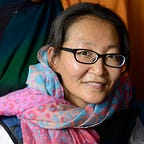How cash assistance is bringing relief to flood-affected families in Pakistan
In August 2020, monsoon rains caused devastating flooding in Sindh Province in Pakistan, leading to the Government of Sindh announcing a state of emergency as 2.5 million people were affected.
The floods had a destructive impact on the livelihood of many people, just like Waliyan Resham. She is a 68-year-old widow and mother who, since the death of her husband, has been taking care of her two children with special needs all by herself.
“I cannot forget the night when our home collapsed due to continuous rains and all our food was destroyed by knee-deep floodwaters,” she said when asked about the floods. “I covered my children with the plastic sheet and spent that night under the open sky while it was still raining.”
Before the flooding, Resham worked as a domestic helper, barely making enough to provide food for her and her children. Then the floods came. Not only their food was gone, their house was washed away, leaving her and her children with no place to go.
To assist vulnerable families like hers, WFP provided emergency food aid in early September 2020. During the first phase of this response, WFP reached 71,500 people (11,000 households) with cash assistance, thanks to contributions from donors like the European Union, made through the European Civil Protection and Humanitarian Aid Operations department (ECHO).
In the second phase WFP will reach another 117,000 people who have not received any assistance. Each household will receive two cash transfers of PKR 7,500 each (approximately US$90 in total).
“I visited the flood-affected areas in the immediate aftermath of the floods, and witnessed firsthand the devastation and despair of the people living there. The EU Humanitarian contribution has been critical in ensuring that the most vulnerable people could provide for their most basic needs until their normal livelihood opportunities resumed,” said WFP Country Director Chris Kaye.
When Resham received her first cash transfer, she immediately hired someone to repair her house so that she and her children could have a roof above their heads to protect them from the cold and the rain. With the second cash entitlement, which she will receive before the end of January 2021, she plans to buy some fruits and vegetables to make nutritious meals for her children.
“I am hopeful,” Resham said. “Once I am back on my feet, I will resume my work and so that I can continue supporting my children and prepare healthy and nutritious meals.”
In addition to the food and cash assistance, the EU humanitarian support has allowed WFP to produce and disseminate information packages on nutrition and hygiene among mothers and children across Sindh province.
WFP’s emergency response has been coordinated with the Provincial Disaster Management Authority (PDMA) of Sindh, the United Nations Office for the Coordination of Humanitarian Affairs (OCHA), and implementing partners including ACTED and Secours Islamique France (SIF). WFP thanks the European Union for their generous contributions.
Written by Mahira Afzal, Communication Officer, WFP Pakistan
